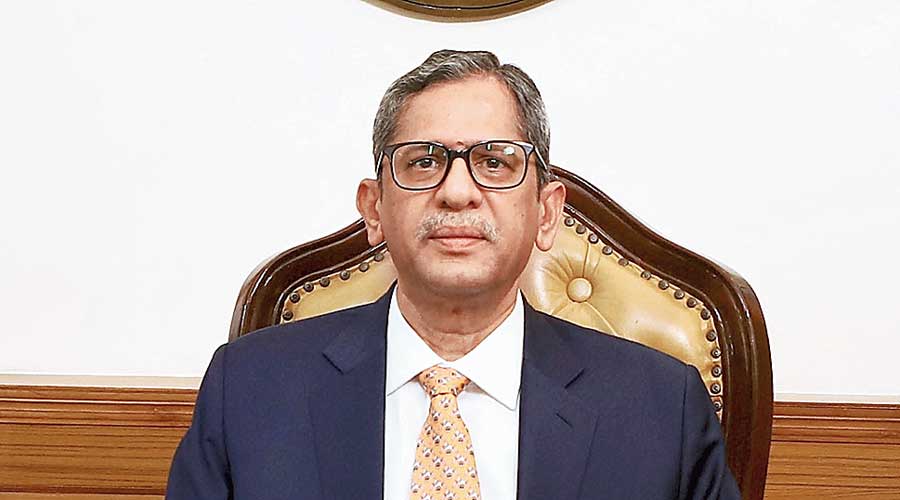The Supreme Court on Monday chided the government for pushing through a tribunal reforms bill without a proper debate in Parliament.
The Opposition has been complaining that bills were being passed without discussion.
“We have not seen any discussion in Parliament. Of course, Parliament has power to make laws. We must at least know what is the reason for the government introducing the bill even after this court striking it (the corresponding ordinance) down (in April),” Chief Justice of India N.V. Ramana told solicitor-general Tushar Mehta.
On Sunday, Justice Ramana had regretted that bills were being passed in Parliament and state legislatures without quality discussions, and cited how every piece of legislation was once debated thoroughly in the Houses.
The government passed 19 bills in the just-ended monsoon session of Parliament, mostly without any debate, as the Opposition stalled proceedings seeking discussions on the Pegasus allegations and other issues.
The Tribunals Reforms (Rationalisation and Conditions of Services) Bill, 2021, vests the Centre with the power to appoint and remove the quasi-judicial members of the various tribunals. Some in the legal fraternity see this as part of a government bid to control the tribunals and erode their independence.
Tribunals such as the National Green Tribunal, Income Tax Appellate Tribunal and the National Company Law Appellate Tribunal are set up with retired judges to deal with specialised issues and decongest the regular courts.
In 2019, a five-judge constitution bench had struck down an amendment to the appointment and removal process that the government had made under the 2017 Finance Act.
Undeterred, the NDA government brought in a fresh ordinance with similar provisions, which the court quashed in April this year on a petition from the Madras Bar Association.
The Centre then got the corresponding bill passed in both Houses of Parliament recently, earning a rebuke from the bench of Justices Ramana, V. Surya Kant and Aniruddha Bose on Monday.
The bench, hearing a public interest plea moved by advocate Amit Sahni for a National and Regional GST Tribunal, asked Mehta whether the government wanted the tribunals to wind up.
Justice Ramana underlined that during the introduction of the bill, the minister concerned had merely stated in one sentence that the apex court had not struck down the ordinance on grounds of unconstitutionality.
The bench asked Mehta to place on record the note the government had prepared before introducing the bill in Parliament.
Mehta argued: “Until the bill has matured into an act, it may not be appropriate on my part to respond. So far as since validity is not in question, I’m not right now in a position,” he said.
The bench also expressed displeasure that the government had, despite earlier assurances, not taken any step to fill the 240-odd vacancies in the various tribunals.
“Show us one appointment you have made. Whenever we ask the ministry about tribunal appointments, you say it is ‘under process’,” Justice Ramana said.
“If you want to make appointments, nothing prevents you from making appointments.”
Justice Ramana then repeated a question he had asked at the last hearing too.
“Mr Mehta, we have a simple question for you. Are you planning to continue with the tribunals or close them down? Everything comes down to this question,” he said.
“So tell us clearly, are you going to make appointments to the tribunals, which are almost on the verge of becoming defunct?”











